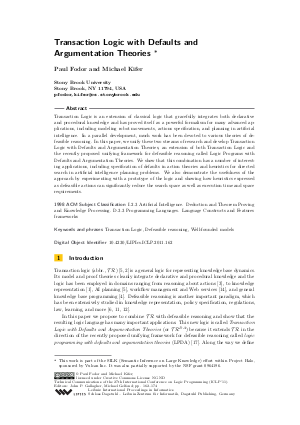Transaction Logic with Defaults and Argumentation Theories
Authors Paul Fodor, Michael Kifer
-
Part of:
Volume:
Technical Communications of the 27th International Conference on Logic Programming (ICLP'11) (ICLP 2011)
Part of: Series: Leibniz International Proceedings in Informatics (LIPIcs)
Part of: Conference: International Conference on Logic Programming (ICLP) - License:
 Creative Commons Attribution-NonCommercial-NoDerivs 3.0 Unported license
Creative Commons Attribution-NonCommercial-NoDerivs 3.0 Unported license
- Publication Date: 2011-06-27
File

PDF
LIPIcs.ICLP.2011.162.pdf
- Filesize: 0.51 MB
- 13 pages
Document Identifiers
Subject Classification
Keywords
- Transaction Logic
- Defeasible reasoning
- Well-founded models
Metrics
- Access Statistics
-
Total Accesses (updated on a weekly basis)
0Document
0Metadata
Abstract
Transaction Logic is an extension of classical logic that gracefully integrates both declarative and procedural knowledge and has proved itself as a powerful formalism for many advanced applications, including modeling robot movements, actions specification, and planning in artificial intelligence. In a parallel development, much work has been devoted to various theories of defeasible reasoning. In this paper, we unify these two streams of research and develop Transaction Logic with Defaults and Argumentation Theories, an extension of both Transaction Logic and the recently proposed unifying framework for defeasible reasoning called Logic Programs with Defaults and Argumentation Theories. We show that this combination has a number of interesting applications, including specification of defaults in action theories and heuristics for directed search in artificial intelligence planning problems. We also demonstrate the usefulness of the approach by experimenting with a prototype of the logic and showing how heuristics expressed as defeasible actions can significantly reduce the search space as well as execution time and space requirements.
Cite As Get BibTex
Paul Fodor and Michael Kifer. Transaction Logic with Defaults and Argumentation Theories. In Technical Communications of the 27th International Conference on Logic Programming (ICLP'11). Leibniz International Proceedings in Informatics (LIPIcs), Volume 11, pp. 162-174, Schloss Dagstuhl – Leibniz-Zentrum für Informatik (2011)
https://doi.org/10.4230/LIPIcs.ICLP.2011.162
BibTex
@InProceedings{fodor_et_al:LIPIcs.ICLP.2011.162,
author = {Fodor, Paul and Kifer, Michael},
title = {{Transaction Logic with Defaults and Argumentation Theories}},
booktitle = {Technical Communications of the 27th International Conference on Logic Programming (ICLP'11)},
pages = {162--174},
series = {Leibniz International Proceedings in Informatics (LIPIcs)},
ISBN = {978-3-939897-31-6},
ISSN = {1868-8969},
year = {2011},
volume = {11},
editor = {Gallagher, John P. and Gelfond, Michael},
publisher = {Schloss Dagstuhl -- Leibniz-Zentrum f{\"u}r Informatik},
address = {Dagstuhl, Germany},
URL = {https://drops.dagstuhl.de/entities/document/10.4230/LIPIcs.ICLP.2011.162},
URN = {urn:nbn:de:0030-drops-31594},
doi = {10.4230/LIPIcs.ICLP.2011.162},
annote = {Keywords: Transaction Logic, Defeasible reasoning, Well-founded models}
}
